|
|
 |
An independent view of the world
seen from Tokelau
The Independent New York Times
Tokelau, Saturday,
November 22,
2008 Weekend Edition, editor
- contact sumpinein@gmail.com
|
 |
|
|
|
|
IN SPITE OF
DOW RALLY IS THIS THE
BEGINNING OF A GREAT DEPRESSION? |
It's a minority but
growing view, including from 86-year old
former Goldman Sachs chairman, John
Whitehead, at the November 12 Reuters
Global Finance Summit in New York. As
disturbing evidence mounts, he said: "I
think it would be worse than the
depression. We're talking about reducing
the credit of the United States of
America, which is the backbone of the
economic system. I see nothing but large
increases in the deficit, all of which
are serving to decrease the credit
standing of America.
|
|
|
Conservationists are excited about the
arrival, which is the first birth of a
pygmy hippo at Taronga zoo in Sydney,
Australia, in 23 years. |
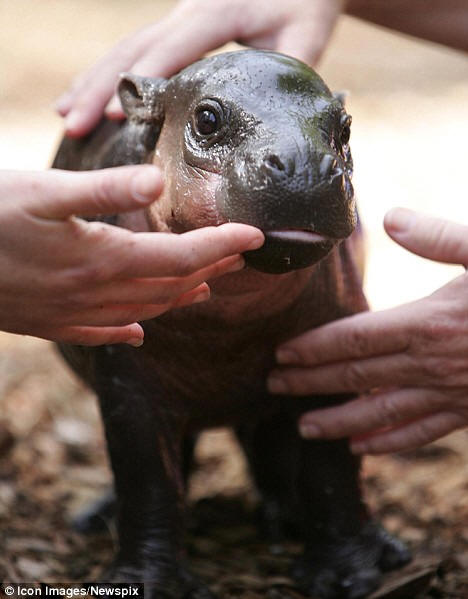 |
 |
|
A UN study says that in financial
terms currently the loss of forest
equals some US$2 to US$5 trillion every
year. Who is going to do something about
all this? Indonesian authorities
have pledged to stop the loss of forests
and species in Sumatra, one of the
world's most ecologically important
islands. Representatives of the island's
10 provinces, national government and
the environment group WWF launched the
deal at the World Conservation Congress.
Sumatra has lost about half of its
forest cover in the last 20 years. It is
home to a number of important and iconic
species such as the tiger, orangutan,
rhinoceros and elephant. The island has
suffered floods and forest fires in
recent years that have been widely
attributed to illegal forest clearance.
Two years ago, President Susilo Bambang
Yudhoyono was forced to apologise to
Singapore and Malaysia when smog from
burning Sumatran forest covered the
neighbouring countries. The need to deal
with these issues appears to have played
a big part in persuading the authorities
to act. "In the rainy months, we are
seeing landslides and flooding more
often, and it is time to make a real
change," said Indonesia's deputy
environment minister Hermien Roosita at
a news briefing here. "Every governor
from the 10 provinces and four
(national) ministries have signed this
monumental commitment to ecosystem
restoration of the island and protecting
the remaining natural forest." More than
13% of the island's forests lie on peat,
which contain vast amounts of carbon
that would be lost to the atmosphere if
the trees were removed, accelerating
climate change. "When you look at the
flora and fauna in this area and the
rate of loss that's going on, this is a
substantial commitment to protect and
restore forests," said Gordon Shepherd,
WWF's director of global policy. The
government has already regulated to stop
clearance of virgin forest for palm oil
plantations - grown for food, industry
and biofuels - but the government
acknowledges the ban may not be
completely effective. |
|
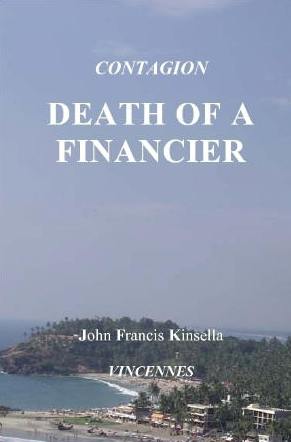
|
Read DEATH OF A
FINANCIER by JOHN
FRANCIS KINSELLA |
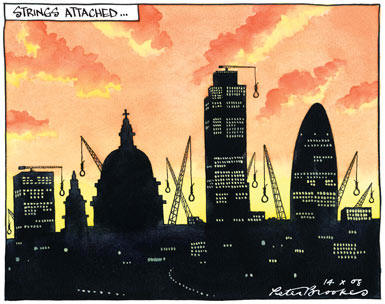
|
Tom Barton, a City
mortgage broker, decides
to quit his business in
the wake of the subprime
crisis and arrives in
Kovalam, in the south of
India. In the Maharaja
Palace he finds himself
in the company of
holiday makers from the
UK, Scandinavia and
Russia. Stephen Parkly,
the CEO of a successful
City bank, and his young
wife Emma are taking a
well earned year end
break. Parkly falls
gravely ill with a
mysterious infection,
whilst back in the City,
unknown to him his
mortgage and investment
bank, West Mercian
Finance is in grave
difficulties. Ryan
Kavanagh, a doctor,
comes to Emma’s aid with
the help of Barton,
after an attempted
cover-up by the Indian
authorities, who fear
for their tourist
industry and more
especially medical
tourism, as the disease
threatens the resort
with the tourist season
in full swing. Thousands
of British tourists
enjoying the sun are
unaware of the pending
disaster, many are
equally unaware their
savings about are to be
wiped out in the West
Mercian collapse. |
|
OR PRINT
VERSION
FROM
| More books by John Francis Kinsella from Vincennes Books: Borneo Pulp, The Legacy of Solomon, Offshore Islands, The Lost Forest |
|
|
|
|
|
|
THE WORLD AS IT
IS...WAS? - A CASINO |
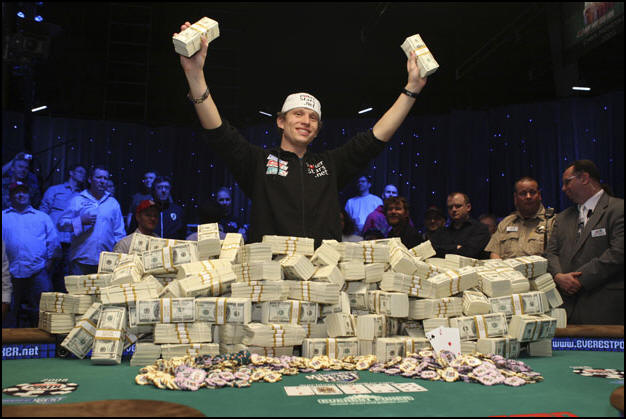
|
Peter Eastgate
of Denmark
celebrates after
winning $9.15
million during
the World Series
of Poker at the
Rio Hotel and
Casino in Las
Vegas, Nevada.
Eastgate, 22,
defeated Ivan
Demidov of
Russia to become
the youngest
champion of the
World Series of
Poker main
event. |
|
|
|
|
TOUGH
TIMES FOR OPEC WITH LOW
PRICES |
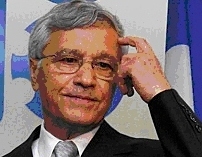 |
|
Opec members
have lost
about $700bn
(£467bn)
because of
falling
crude
prices, the
oil cartel's
president
Chakib
Khelil said
in an
interview.
Oil prices
have fallen
60% from
their $147
peak,
prompting
speculation
Opec will
cut output
again to
boost
prices. However,
speaking to
Algerian
newspaper El Khabar, Mr
Khelil said
Opec was
unlikely to
make a
decision
this month.
He said the
following
meeting on
17 December
would be
"the most
important"
as the
cartel would
get
necessary
data.
The data
will show
whether
Opec's
previous
output cuts
have been
applied by
its members.
The cartel,
which
controls 40%
of the
world's oil
supply,
agreed on a
1.5 million
barrel-a-day
reduction
last month.
On
Wednesday,
US light,
sweet crude
stood at
$54.47 a
barrel,
while Brent
crude cost
$51.84 a
barrel.
"The Cairo
meeting [on
29 November]
is
considered
as an
internal
debate,
while the
meeting
scheduled in
Oran [on 17
December],
will be more
important in
a sense that
we will
obtain, by
that time,
more
information
about the
oil market
trend," El
Khabar
quoted Mr
Khelil as
saying.
"All
members...
are very
concerned
about the
economic
situation
which has
worsened in
the United
States and
Europe who
have entered
into a
recession,
followed by
Japan," the
Opec
president
said. |
|
|
G20? G TOO MANY |
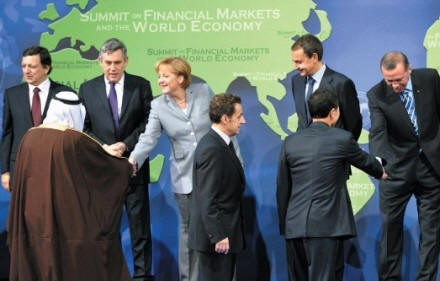
|
Vincent Cable
wrote that by
the low
standards of
economic
summitry, the
G20 meeting
rated quite
high. There was
a predictable,
no doubt
pre-written,
communiqué, full
of the usual
banalities. And
the meeting
suffered from
the absence of
the world's most
important
politician, who
hasn't yet taken
up office. But,
these necessary
caveats aside,
there were
important
achievements.
The first is
that the meeting
took place at
all. The
ludicrous
pretence of the
G8 (or G7) that
the old western
powers should
set the global
economic agenda
has been
punctured for
good. On a
purchasing power
parity basis,
China has the
second-biggest
economy in the
world and India
the fourth. It
has been clear
for some time
that China is
lender of last
resort to the
global system
(by, in effect,
underwriting US
government
paper) and the
main source of
global
incremental
demand (and
commodity price
inflation). The
Chinese
self-parody as
the pupil
sitting meekly
at the feet of a
dominant, but
erring, master
defies belief.
It is obviously
right that
China, India and
the other main
non-G7 countries
should be at the
top table. The
second
achievement was
the clear
realisation that
unless
governments hang
together they
will hang
separately.
Enough has been
learned from
interwar history
for us to
understand the
follies of
beggar-my-neighbour
economics.
Perhaps a
warning shock
was being sent
across the bows
of the incoming
Obama
administration
not to reinvent
the
protectionist
tariffs of the
1930s in a new
guise, directed
at China or
Mexico in
particular, or
aiming to
salvage the US
auto industry
through public
subsidy. But
this new-found
concern for open
markets has not
yet communicated
itself to EU or
Indian or
Chinese trade
negotiators, who
show no
enthusiasm for
lifting the
block on trade
liberalisation
under the Doha
round. While
trade policy is
on the back
burner,
macroeconomic
policy
co-ordination is
not. With a few
exceptions -
Germany notably
- there is
recognition of
the need for
aggressive
monetary and
fiscal policy
and for
large-scale
intervention to
recapitalise
banks. These
interventions
can be and are
being undertaken
nationally. But
governments
acting in
isolation
attract critical
attention from
capital markets
and currency
speculators, as
Gordon Brown is
discovering.
Structures like
the G20 are the
best safeguard
against chaotic,
unilateral
action. |
|
|
Anxiety Rises for US
Farmers as Crop Prices
Fall |
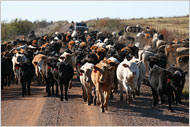 |
|
|
|

|
LONDON (Reuters) - Oil dived
under $50 a barrel on
Thursday to hit the lowest
level since May 2005,
deepening losses as
financial markets reflected
ever lower confidence in the
world economy and evidence
mounted of falling fuel
demand. U.S. crude fell $3.26 to
$50.36 a barrel by 3:36 p.m.
after earlier touching
$49.75, marking the lowest
level since May 25, 2005,
when prices hit $49.58. London Brent crude shed
$2.82 to $48.90 a barrel. As economic slowdown has
destroyed fuel demand, oil
companies plan to store
millions of barrels of oil
in the hope economics will
improve. The number of U.S.
workers filing new claims
for jobless benefits rose by
a larger than expected
27,000 last week to their
highest level in 16 years,
Labour Department data
showed on Thursday. "The unemployment data
was yet another ugly data
point in a seemingly never
ending stream of poor
economic numbers," said
Michael Wittner, global head
of oil research at Societe
Generale. "What makes it hard to
call a bottom is that even
when oil fundamentals firm
up, if we're still having
these waves of deleveraging
it can overwhelm even the
oil fundamentals." |
|
|
CLOUDS OVER GULF |
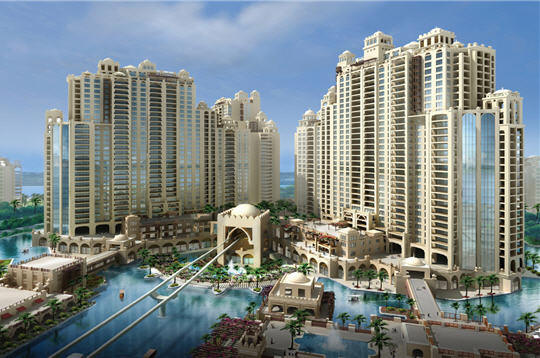
|
Is the fun over? Saudi Arabia
and Dubai are now down by around
50% this year, Kuwait down 20%
and the MSCI index tracking the
Gulf's key markets has lost 43%.
Last week, Kuwait became the
third Gulf state to prop up its
banking system, guaranteeing
deposits after bailing out the
country's fifth-biggest lender,
Gulf Bank, whose corporate
clients had defaulted on
currency bets. The United Arab
Emirates, of which Dubai is the
second-largest member, has
guaranteed local bank accounts
for three years and made $33bn
available to the banking system
amid a squeeze in local money
markets. Saudi Arabia has put
$5bn into commercial banks and
set aside $2.7bn for no-fee
loans to low-income citizens.
Central banks across the region
have also cut benchmark interest
rates. The main worry now is the
real-estate market, where credit
conditions are tightening – HSBC
will now only lend up to 70% of
the value of a property, down
from 85% – and the property boom
is rapidly cooling. Cairo-based
EFG-Hermes reckons property
values could slide by 20% in the
next three years. "I see the
risk of a real-estate bust
throughout the Gulf" amid
sliding oil prices and a
liquidity and credit crunch,
says Nouriel Roubini of New York
University. And "there's a huge
amount of excess capacity being
built": Dubai and Saudi
billionaire Prince Alwaleed are
currently racing to build the
world's first kilometre-tall
tower. Dubai can tap another
emirate, Abu Dhabi, for cash,
while the region as a whole
boasts a projected $150bn in
budget surpluses for 2008. The
IMF thinks most Gulf states
should be able to balance their
budgets unless oil slides below
$30 a barrel, says Andrew
Crichlow on WSJ.com. With large
current-account surpluses and
relatively low external
financing needs, the region
looks more resilient than other
emerging markets, says Merrill
Lynch, which has lowered its
regional 2009 GDP forecast to
4.5% from 6.2%. But while the
Gulf may not fall victim to an
emerging-market crisis, the
notion that it is a safe haven
from global turmoil has been
well and truly shattered. |
|
|
|
The
map shows hectares' worth consumed in goods and
services |
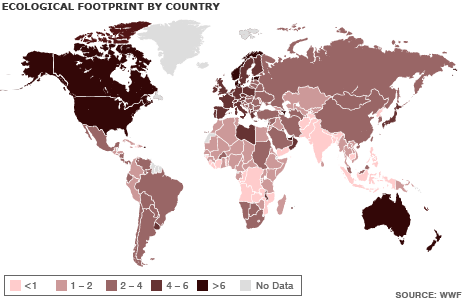 |
|
The planet is headed for an
ecological "credit crunch", according to
a report issued by conservation groups.
The document contends that our demands
on natural resources overreach what the
Earth can sustain by almost a third. The
Living Planet Report is the work of WWF,
the Zoological Society of London and the
Global Footprint Network. It says that
more than three quarters of the world's
population lives in countries where
consumption levels are outstripping
environmental renewal.
This makes them "ecological debtors", meaning that they are drawing
- and often overdrawing - on the
agricultural land, forests, seas and
resources of other countries to sustain
them. The report concludes that the
reckless consumption of "natural
capital" is endangering the world's
future prosperity, with clear economic
impacts including high costs for food,
water and energy. "If our demands on the
planet continue to increase at the same
rate, by the mid-2030s we would need the
equivalent of two planets to maintain
our lifestyles," said WWF International
director-general James Leape. Dr Dan
Barlow, head of policy at the
conservation group's Scotland arm,
added: "While the media headlines
continue to be dominated by the economic
turmoil, the world is hurtling further
into an ecological credit crunch." The
countries with the biggest impact on the
planet are the US and China, together
accounting for some 40% of the global
footprint. The report shows the US and
United Arab Emirates have the largest
ecological footprint per person, while
Malawi and Afghanistan have the
smallest. "The events in the last few
months have served to show us how it's
foolish in the extreme to live beyond
our means," said WWF's international
president, Chief Emeka Anyaoku.
"Devastating though the financial credit
crunch has been, it's nothing as
compared to the ecological recession
that we are facing." He said the more
than $2 trillion (£1.2 trillion) lost on
stocks and shares was dwarfed by the up
to $4.5 trillion worth of resources
destroyed forever each year. The
report's Living Planet Index, which is
an attempt to measure the health of
worldwide biodiversity, showed an
average decline of about 30% from 1970
to 2005 in 3,309 populations of 1,235
species. An index for the tropics shows
an average 51% decline over the same
period in 1,333 populations of 585
species. |
|
|
|
|
|
YES, IT'S ONLY ONE
MONTH TO CHRISTMAS |

|
Sales fall
in stores across
the world as
Christmas
approaches and
the crisis
starts to bite
and incomes fall
and unemployment
fears start to
make inroads
with families
cutting back on
spending. This
year is
beginning to
look like it
will be the
worse for
business for a
decade as the
Christmas season
approaches. |
|
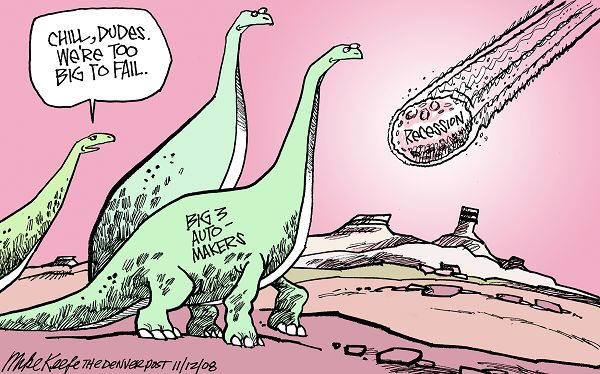 |
|
Credit crunch
hits the art
market |

|
The global
financial
meltdown has
struck the art
market, with a
Francis Bacon
self-portrait
with an estimate
of $40m failing
to sell at a
disappointing
auction in New
York last night.
Almost a third
of 75
contemporary
artworks that
went under the
hammer at
Christie's in
Rockefeller
Plaza did not
find buyers at
last night's
contemporary art
auction. Among
the rejects was
Bacon's Study
for
Self-Portrait,
which was billed
as the highlight
of the sale and
which Christie's
had estimated
would sell for
around $40m
(£27m). |
|
|
|
|
|
People lined up for food last
week at one of the distribution outlets
supported by the San Francisco Food Bank. The
food bank's managers fret that they won't be
able to keep up with demand despite improved
fund raising. |
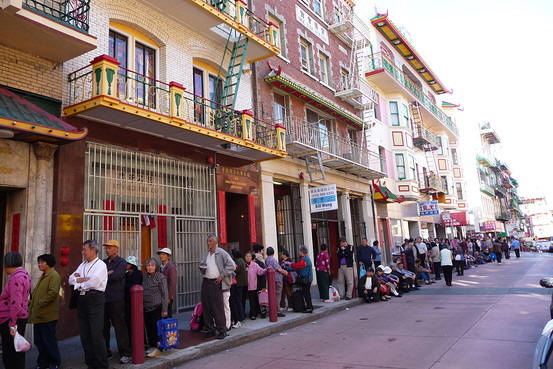
|
350,000
JOBS TO GO IN BANK & FINANCIAL COLLAPSE
- READ 'DEATH OF A FINANCIER' |
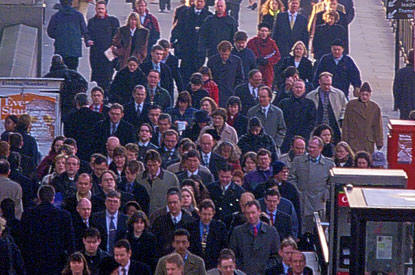 |
|
|
SPARE A
THOUGHT FOR THE YACHT OWNERS HIT BY CRISIS |
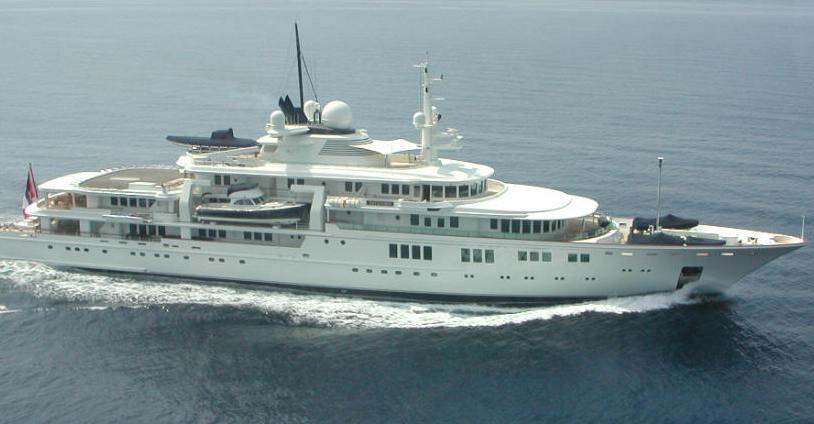
|
They were the ultimate status symbol of
the boom years, coveted by billionaire
businessmen who wanted to show off their
wealth, but the value of superyachts is
plummeting as the credit crunch really
begins to bite. Many owners are being
forced to sell their boats as their
other assets fall, and dealers are
slashing prices as the market slows.
Some bargains are on offer, according to
dealers, including the 164ft Alibella,
which boasts a helipad and marble
fixtures and fittings finished with gold
trim, and is now available for just
€24.5m (£21m) - an huge €9.5m discount -
if a buyer can come up with the cash
within a month.
Edmiston, a London-based yacht
brokers, says it was delivered to its
anonymous owner six months ago, but they
are now seeking a quick sale. An email
sent to clients by William Christie, a
broker at the company said: "The owner
will sell at this massively reduced
price if the deal can be completed
within 30 days." The Alibella can
accommodate 14 guests in six cabins, but
cheaper second-hand yachts are also
available. The 163ft Thunder B, which
has a seven-metre swimming pool, is now
available for €13.7m, down from €18.9m
and the asking price on the 146ft
Candyscape has also been slashed,
from €15.5m to €12.9m. The interior of
the boat was designed by Candy & Candy,
the upmarket property developer owned by
brothers Nick and Christian Candy, and
boasts a saloon with a giant
entertainment system, including a pop-up
flat-screen television. The 150ft
Midlandia, meanwhile, has been reduced
in price from €27m to €19.9m. It comes
with bullet-proof glass and an outdoor
cinema; perfect for a security-conscious
film buff with a few millions to spare. |
|
|
|
|
|
Since food prices began to rise
100 million more people have been pushed into poverty,
according to the World Bank, with as many as two billion
on the verge of disaster. Almost half the world's
population, let's remember, live on less than $2.50 per
day. Millions die annually of hunger and starvation, and
more than a billion do not have access to fresh water. |
With the world financial crisis
these numbers are poised to rise dramatically with
population growth, dwindling natural resources and
higher consumer prices across all goods and services. So
as the stock market tumbles and the world economy
falters, it's important to remember that it's more than
financial losses we are talking about, it's the loss of
life. |
|
|